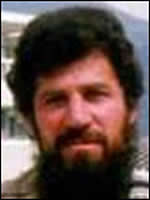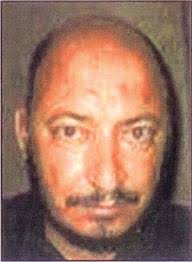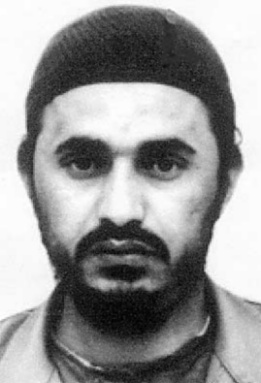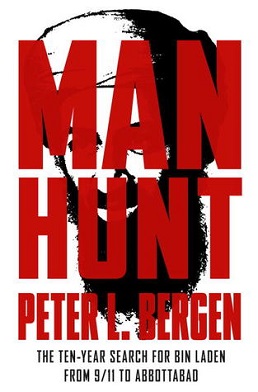
Jama'at al-Tawhid wal-Jihad, abbreviated as JTJ or Jama'at, was a Salafi jihadist militant group. It was founded in Jordan in 1999, and was led by Jordanian national Abu Musab al-Zarqawi for the entirety of its existence. During the Iraqi insurgency (2003–11), the group became a decentralized network with foreign fighters with a considerable Iraqi membership.

The Saddam Hussein and al-Qaeda link allegations were based on false claims by the United States government alleging that a secretive relationship existed between Iraqi president Saddam Hussein and the Sunni pan-Islamist militant organization al-Qaeda between 1992 and 2003. U.S. president George W. Bush used it as a main reason for invading Iraq in 2003.
Abu Musab al-Suri, born Mustafa bin Abd al-Qadir Setmariam Nasar, is a suspected Al-Qaeda member and writer best known for his 1,600-page book The Global Islamic Resistance Call. He is considered by many as 'the most articulate exponent of the modern jihad and its most sophisticated strategist'.

Nashwan Abdulrazaq Abdulbaqi al-Tamir, better known as Abd al-Hadi al-Iraqi is an Iraqi member of Al-Qaeda who is now in United States custody at Guantanamo Bay detention camp in Cuba.

Abu Ayyub al-Masri, also known as Abu Hamza al-Muhajir, born Abdel Moneim Ezz El-Din Ali Al-Badawi, was an Egyptian militant leader who became the leader of Al-Qaeda in Iraq during the Iraqi insurgency, following the death of Abu Musab al-Zarqawi in June 2006. He was appointed as the "minister of war" of the Islamic State of Iraq from 2006 to 2010 and prime minister of the Islamic State of Iraq from 2009 to 2010. He was killed along with ISI's leader Abu Omar al-Baghdadi during a raid on their safehouse on 18 April 2010.
This article is a chronological listing of allegations of meetings between members of al-Qaeda and members of Saddam Hussein's government, as well as other information relevant to conspiracy theories involving Saddam Hussein and al-Qaeda.

Abu Omar al-Baghdadi, born Hamid Dawud Mohamed Khalil al-Zawi was an Iraqi militant who was the Emir of the Islamic militant umbrella organization Mujahideen Shura Council (MSC), and its successor, the Islamic State of Iraq (ISI), which fought against the U.S.-led Coalition forces during the Iraqi insurgency.

Abu Musab al-Zarqawi, born Ahmad Fadeel Nazal al-Khalayleh, was a Jordanian militant jihadist who ran a training camp in Afghanistan. He became known after going to Iraq and being responsible for a series of bombings, beheadings, and attacks during the Iraq War, reportedly "turning an insurgency against US troops" in Iraq "into a Shia–Sunni civil war". He was sometimes known by his supporters as the "Sheikh of the slaughterers".

Bay'at al-Imam was a jihadist group active from 1994 to 1999, led by Abu Muhammad al-Maqdisi and later Abu Musab al-Zarqawi. Some scholars dispute the group's existence.
Hassan Ghul, born Mustafa Hajji Muhammad Khan, was a Saudi-born Pakistani member of al-Qaeda who revealed the kunya of Osama bin Laden's messenger, which eventually led to Operation Neptune Spear and the death of Osama Bin Laden. Ghul was an ethnic Pashtun whose family was from Waziristan. He was designated by the Al-Qaida and Taliban Sanctions Committee of the Security Council in 2012.

Al-Qaeda in Iraq, was a Salafi jihadist organization affiliated with al-Qaeda. It was founded on 17 October 2004, and was led by Abu Musab al-Zarqawi until its disbandment on 15 October 2006 after he was killed in a targeted bombing on June 7, 2006 in Hibhib, Iraq by the United States Air Force.
The 2004 Karbala and Najaf bombings were car bombings that tore through a funeral procession in Najaf and through the main bus station in nearby Karbala—two Shia holy cities – on 19 December 2004. 66 people were killed and 191 wounded.

It is believed that members of Al-Qaeda are hiding along the border of Afghanistan and northwest sections of Pakistan. In Iraq, elements loosely associated with al-Qaeda, in the Jama'at al-Tawhid wal-Jihad organization commanded by Abu Musab al-Zarqawi, have played a key role in the War in Iraq.
Shadi Abdalla is as an associate of Abu Musab al Zarqawi, the leader of al Qaeda in Iraq, and as having knowledge of some of al Qaeda's most important Afghan training camps.

Manhunt: The Search for Bin Laden is a 2013 documentary film directed by Greg Barker that explores the Central Intelligence Agency's investigation of Osama bin Laden, starting from 1995 until his death in 2011. It premiered on HBO on May 1, 2013, two years after the mission that killed bin Laden. The documentary features narratives by many of the CIA analysts and operatives who worked over a decade to understand and track bin Laden, and includes archival film footage from across Washington, D.C., Pakistan, Saudi Arabia and elsewhere in the Middle East. It also features extensive and rarely seen footage of Al-Qaeda training and propaganda videos, including video suicide notes from various terrorists who later worked as suicide bombers.

The Islamic State of Iraq was a Salafi jihadist militant organization that fought the forces of the U.S.-led coalition during the Iraqi insurgency. The organization aimed to overthrow the Iraqi federal government and establish an Islamic state governed by Sharia law in Iraq.

Abd al-Rahman Mustafa al-Qaduli, better known as Abu Ali al-Anbari, was the governor for territories held by the Islamic State of Iraq and the Levant (ISIL) in Syria. Considered the ISIL second-in-command, he was viewed as a potential successor of ISIL leader Abu Bakr al-Baghdadi.
Muhammad Yusuf Uthman Abd al Salam (2014–1956) was the founder of Jund al-Aqsa, a Salafist jihadist group active in the Syrian Civil War. He is also commonly referred to by his nom de guerre Abu Abdulaziz al-Qatari. He was a Jordanian citizen of Palestinian origin who lived in Qatar.

Manhunt: The Ten Year Search for Bin Laden From 9/11 to Abbottabad is Peter Bergen's fourth book on the subject of Osama bin Laden and Al-Qaeda. It was originally published in 2012 and became a New York Times bestseller later that year. It would then become the basis for an HBO documentary, Manhunt: The Search for Bin Laden.
Abdel Majid al-Majali Also known as Abu Qutaibah al Majali and Abu Qutayba al-Ordony is a Salafi jihadist from Al Karak who recruited Abu Musab al-Zarqawi to fight in Afghanistan. He was one of participants in the Afghan Arabs, and the manager of Maktab al-Khidamat in Jordan. his older son qutaibah is fighting with Islamic State of Iraq and the Levant and his other son Yusef returned from fighting with ISIS. He was arrested in 2014 because of encouraging people to fight with ISIS. Some Jordanian writers claimed that his jihadist activities was linked with 2016 Al-Karak attack.














